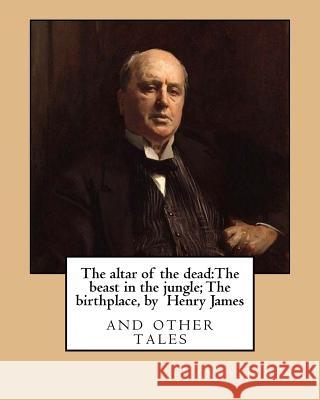The altar of the dead: The beast in the jungle; The birthplace, by Henry James: and other tales » książka
The altar of the dead: The beast in the jungle; The birthplace, by Henry James: and other tales
ISBN-13: 9781533277671 / Angielski / Miękka / 2016 / 224 str.
The altar of the dead: The beast in the jungle; The birthplace, by Henry James: and other tales
ISBN-13: 9781533277671 / Angielski / Miękka / 2016 / 224 str.
(netto: 52,88 VAT: 5%)
Najniższa cena z 30 dni: 51,42 zł
ok. 13-18 dni roboczych.
Darmowa dostawa!
"The Altar of the Dead" is a short story by Henry James, first published in his collection Terminations in 1895. A fable of literally life and death significance, the story explores how the protagonist tries to keep the remembrance of his dead friends, to save them from being forgotten entirely in the rush of everyday events. He meets a woman who shares his ideals, only to find that the past places what seems to be an impassable barrier between them. Although James was not religious in any conventional sense, the story shows a deep spirituality in its treatment of mortality and the transcendent power of unselfish love.Aging George Stransom holds sacred the memory of the great love of his life, Mary Antrim, who died before they could be married. One day Stransom happens to read of the death of Acton Hague, a former friend who had done him a terrible harm. Stransom starts to dwell on the many friends and acquaintances he is now losing to death. He begins to light candles at a side altar in a Catholic church, one for each of his Dead, except Hague. Later he notices a woman who regularly appears at the church and sits before his altar. He intuitively understands that she too honours her Dead, and they very gradually become friends. However Stransom later discovers that her Dead number only one: Acton Hague. Hague had wronged her too, but she has forgiven him. When his friend realises Stransom's feelings about Hague, she declares that she can no longer honour Hague at Stransom's altar. Stransom cannot bring himself to resolve the issue by forgiving Hague and adding a candle for him. This disagreement drives the two friends apart. Stransom's friend ceases visiting the altar, and Stransom himself can find no peace there The Beast in the Jungle is a 1903 novella by Henry James, first published as part of the collection, The Better Sort. Almost universally considered one of James' finest short narratives, this story treats appropriately universal themes: loneliness, fate, love and death. The parable of John Marcher and his peculiar destiny has spoken to many readers who have speculated on the worth and meaning of human life.John Marcher, the protagonist, is reacquainted with May Bartram, a woman he knew ten years earlier, who remembers his odd secret: Marcher is seized with the belief that his life is to be defined by some catastrophic or spectacular event, lying in wait for him like a "beast in the jungle." May decides to buy a house in London with the money she inherited from a great aunt, and to spend her days with Marcher, curiously awaiting what fate has in store for him. Marcher is a hopeless egoist, who believes that he is precluded from marrying so that he does not subject his wife to his "spectacular fate." Once installed as the custodian, Morris begins to doubt the chatter he is forced to give to tourists who visit the home. He starts to qualify and hesitate in his spiel. This brings anguish to his wife and a warning from the shrine's proprietors. Gedge finally decides that if silliness is what's wanted, he'll supply it abundantly. The last section of the story shows him delivering a hilarious lecture on how the child Shakespeare played around the house. Of course, receipts from tourists increase and Gedge gets a raise.











